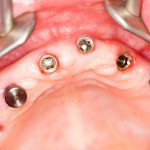
In recognition of the possibility of serious adverse events from antibiotic use and the growing threat of antibiotic resistance the 2015 consensus conference of the EAO (European Association for Osseointegration) recommended that antibiotic prophylaxis should not be recommended in straightforward implant surgery in health patients. However, in cases where use of antibiotics is required identifying the best protocol is important.
The aim of this review was to assess the effectiveness of different antibiotic protocols to prevent early dental implant failure.
Methods
Searches were conducted in the Medline/PubMed, Scopus, Cochrane Central and Web of Knowledge databases. Had searches were also carried out in the Journals; Journal of Clinical Periodontology; Clinical Oral Implants Research; Clinical Implant Dentistry and Related Research; Journal of Periodontology; European Journal of Oral Implantology; The International Journal of Oral & Maxillofacial Implants. Only randomised controlled trials (RCTs) involving antibiotic administration pre, intra or post operatively for the placement of dental implants involving at least 20 patients and having at least 3 months follow up were considered.
Two reviewers independently, selected studies, extracted data and assessed risk of bias using the Cochrane tool. The outcomes considered were implant failure and adverse effects. the estimate of effect of an intervention was expressed as odds ratio (OR) together with 95% confidence interval (CI). A network meta-analysis (NMA) was conducted.
Results
- 9 trials (1576 patients analysed) were included.
- All the trials involved the use of amoxicillin using different dosages and timings.
- 2 of the studies were considered to be at low risk of bias and 5 at high risk of bias.
- Antibiotic prophylaxis was protective in terms of implant loss with failure rate of 1.8% in those receiving antibiotics compared with 5.6% in those not receiving antibiotics; OR = 0.28 (95%CI; 0.14–0.55).
- Adverse effects were reported in only 4 out of 947 patients receiving antibiotics.
- NMA was only performed for implant failures;
- All antibiotic protocols were more effective in reducing implant failures compared to placebo/no antibiotic
- A single dose of 3 g of amoxicillin administered 1 hr pre-operatively had the highest probability of reducing implant failures.
Conclusions
The authors concluded: –
the use of antibiotic prophylaxis is protective against early implant failures. Whenever an antibiotic prophylaxis is needed, there is still insufficient evidence to confidently recommend a specific dosage. The use of post-operative courses does not seem however to be justified by the available literature.
Comments
All the studies included in this review by Romandini were included in the review by Khouly et al we considered in our recent blog (Dental Elf – 9th May 2019). That review found no evidence of benefit from antibiotic use in healthy patients while this review demonstrated a benefit. The key difference is the outcome measures used by the reviews. The Khouly review reported on early, late or total post-operative infection and wound dehiscence while the Romandini review looked primarily at implant failure.
A 2013 Cochrane review by Esposito et al found that:-
Scientific evidence suggests that, in general, antibiotics are beneficial for reducing failure of dental implants placed in ordinary conditions. Specifically, 2 g or 3 g of amoxicillin given orally, as a single administration, one hour preoperatively significantly reduces failure of dental implants. No significant adverse events were reported. It might be sensible to suggest the use of a single dose of 2 g prophylactic amoxicillin prior to dental implant placement. It is still unknown whether postoperative antibiotics are beneficial, and which antibiotic is the most effective.
The current review includes 3 new studies not published at the date of publication of the Cochrane review with the NMA suggesting a preference for 3g of amoxicillin one hour pre-operatively in comparison with the earlier Cochrane review. As the review authors highlight only a small number of studies are available and amoxicillin (in a small range of protocols) was the only antibiotic tested.
Links
Primary Paper
Romandini M, Tullio I, Congedi F, Kalemaj Z, D’Ambrosio M, Laforí A, Quaranta C, Buti J, Perfetti G. Antibiotic prophylaxis at dental implant placement: Which is the best protocol? A systematic review and network meta-analysis. J Clin Periodontol. 2019 Mar;46(3):382-395. doi: 10.1111/jcpe.13080. Review. PubMed PMID: 30729548.
Other references
Klinge B, Flemming T, Cosyn J, De Bruyn H, Eisner BM, Hultin M, Isidor F, Lang NP, Lund B, Meyle J, Mombelli A, Navarro JM, Pjetursson B, Renvert S, Schliephake. The patient undergoing implant therapy. Summary and consensus statements. The 4th EAO Consensus Conference 2015. Clin Oral Implants Res. 2015 Sep;26 Suppl11:64-7. doi: 10.1111/clr.12675. Review. PubMed PMID: 26385621.
Esposito M, Grusovin MG, Worthington HV. Interventions for replacing missing teeth: antibiotics at dental implant placement to prevent complications. Cochrane Database Syst Rev. 2013 Jul 31;(7):CD004152. doi: 10.1002/14651858.CD004152.pub4.Review. PubMed PMID: 23904048.
Dental Elf – 9th May 2019
Antibiotic prophylaxis for dental implants in healthy patients, is it necessary?

good work, i need this paper